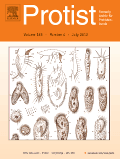
PROTIST
metrics 2024
Fostering Global Collaboration in Protist Research
Introduction
PROTIST is a leading journal in the field of microbiology, focusing on the diverse and often complex world of protists. Published by Elsevier GmbH in Germany, this academic journal has established itself as a valuable resource for researchers, professionals, and students alike. Covering a wide range of topics within the realm of protistology, including taxonomy, ecology, and evolutionary biology, PROTIST aims to promote the understanding of these essential microorganisms, which play critical roles in ecosystem dynamics and human health. Although it currently holds a Q3 ranking in the 2023 category quartiles for Microbiology, it aspires to elevate its status through high-quality articles and innovative research findings. The journal operates under an open-access model, fostering global dissemination of knowledge and encouraging collaborative research. With its extensive scope—from its convergence starting in 1998 to its anticipated developments through 2024—PROTIST remains a vital platform for advancing the study of protists and their impact on our world.
Metrics 2024
 0.50
0.50 1.90
1.90 2.10
2.10 84
84Metrics History
Rank 2024
Scopus
IF (Web Of Science)
JCI (Web Of Science)
Quartile History
Similar Journals

ZHURNAL OBSHCHEI BIOLOGII
Unveiling the Mysteries of Life Since 1945ZHURNAL OBSHCHEI BIOLOGII, published by MEZHDUNARODNAYA KNIGA in the Russian Federation, is a venerable journal with a rich history originating in 1945. Renowned for its contributions to the fields of Ecology, Evolution, Behavior, and Systematics, as well as Medicine (miscellaneous), this journal provides a platform for researchers and professionals to disseminate significant findings within these domains. Although currently not classified as an open access publication, ZHURNAL OBSHCHEI BIOLOGII holds a Q4 quartile designation in its respective categories, reflecting its unique positioning within the global research landscape. While its coverage in Scopus is limited, the journal remains an important resource for academics interested in the evolution of biological sciences, especially within the context of Russian research traditions. By fostering scholarly communication and collaboration, ZHURNAL OBSHCHEI BIOLOGII continues to play a critical role in advancing knowledge in the biological sciences.

GENETICS AND MOLECULAR BIOLOGY
Empowering researchers to shape the future of biology.GENETICS AND MOLECULAR BIOLOGY, published by the SOC BRASIL GENETICA, is a prominent journal dedicated to the advancement of knowledge in the fields of genetics and molecular biology. Since its inception in 1998, this Open Access journal has served as a vital platform for researchers, professionals, and students to disseminate their findings and engage with the latest innovations and discoveries. With an impact factor that reflects its growing influence, GENETICS AND MOLECULAR BIOLOGY ranks in the Q3 category for both genetics and molecular biology as of 2023, indicating its position within the academic community. The journal is indexed in Scopus, highlighting its commitment to maintaining rigorous peer-review standards while providing wide-reaching access to quality research. Operating out of Ribeirão Preto, Brazil, it fosters a collaborative environment for academic discourse and research development not only in Brazil but also globally. The journal encourages submissions that explore a wide range of topics in genetics and molecular biology, making it an essential resource for anyone involved in these dynamic fields.
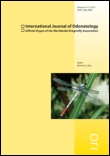
INTERNATIONAL JOURNAL OF ODONATOLOGY
Advancing Research in Dragonfly and Damselfly EcologyINTERNATIONAL JOURNAL OF ODONATOLOGY, published by Wachholtz Verlag GmbH, is a vital resource for researchers and professionals in the fields of Ecology, Evolution, Behavior, and Insect Science. Established in 1998, this journal provides a platform for the dissemination of innovative research pertaining to odonatology, encompassing the ecological and biological interactions of dragonflies and damselflies. With its focus on advancing knowledge within these scientific disciplines, the journal holds a commendable Q3 ranking in Ecology, Evolution, Behavior and Systematics and a Q2 ranking in Insect Science for 2023, reflecting its significance in academic circles. Although it operates without open access, its articles are accessible through institutional subscriptions, allowing for wide dissemination among scholars and practitioners. The journal's commitment to publishing high-quality, peer-reviewed research makes it an authoritative source of information that enriches the study of odonates and their broader ecological contexts. For inquiries, the journal's editorial team can be reached at C/O Fleet7, Fleethorn 7, Kiel 24103, Germany.
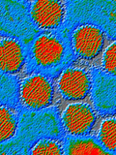
Annual Review of Microbiology
Elevating Microbiology: Where Research Meets InnovationAnnual Review of Microbiology is a preeminent academic journal published by Annual Reviews, specializing in the dynamic field of microbiology. With a rich history dating back to 1948, this journal has become a vital resource for researchers, professionals, and students alike, providing comprehensive reviews that synthesize the latest advancements and trends in microbiological research. The journal is renowned for its impressive reputation, holding a Q1 ranking in both Medicine (miscellaneous) and Microbiology, and achieving an outstanding Scopus rank of #12 out of 182 in the field, placing it in the 93rd percentile. Although it does not offer open access, the Annual Review of Microbiology remains integral to advancing knowledge and understanding of microbial science, helping to bridge the gap between fundamental research and practical applications in health, industry, and environmental sustainability. Its meticulously curated content serves as a crucial platform for fostering innovation and collaboration among the global research community.
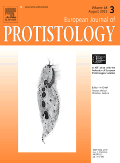
EUROPEAN JOURNAL OF PROTISTOLOGY
Shaping the Future of Microbial ScienceThe EUROPEAN JOURNAL OF PROTISTOLOGY, published by Elsevier GmbH, serves as a premier platform for disseminating high-quality research in the field of microbiology, particularly focusing on protistology. With its ISSN 0932-4739 and E-ISSN 1618-0429, this journal has been an essential resource for academics and professionals since its inception in 1987, continuing to impact the scientific community through to 2024. Ranked in the 2023 Q3 category for microbiology, it occupies a significant position in the Scopus rankings, specifically within the disciplines of Immunology and Microbiology, emphasizing its relevance amid a competitive landscape. The journal's commitment to advancing our understanding of protists fosters innovation and contributes to critical discourse among researchers and students alike. Although it does not currently offer open-access options, its rigorous peer-review process ensures that all published work maintains the highest standards of scientific integrity and relevance, making it an indispensable reference for those engaged in microbiological research.
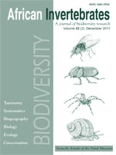
AFRICAN INVERTEBRATES
Illuminating Africa's Invertebrate Diversity and ChallengesAFRICAN INVERTEBRATES is a distinguished open-access academic journal published by the COUNCIL NATAL MUSEUM, specializing in the study of invertebrate biology within the vibrant ecosystems of Africa. Operating since 2006, this journal has established itself as a vital resource in the fields of Animal Science, Ecology, Evolution, Behavior, Insect Science, and Paleontology, earning a strong Q2 ranking in these categories as of 2023. With its ISSN 1681-5556 and E-ISSN 2305-2562, the journal provides unrestricted access to cutting-edge research, fostering collaboration among global researchers and professionals. AFRICAN INVERTEBRATES serves not only as a platform for high-quality scholarly articles but also aims to enhance the understanding of Africa's unique invertebrate fauna and the ecological challenges they face. With a commitment to innovation and excellence, the journal is pivotal for those looking to contribute to the discourse surrounding African biodiversity and conservation strategies.
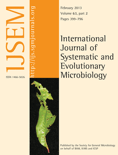
INTERNATIONAL JOURNAL OF SYSTEMATIC AND EVOLUTIONARY MICROBIOLOGY
Charting the Evolutionary Pathways of MicroorganismsInternational Journal of Systematic and Evolutionary Microbiology, published by the Microbiology Society, stands at the forefront of microbiological research, focusing on the systematic and evolutionary aspects of microorganisms. With its ISSN 1466-5026 and e-ISSN 1466-5034, this prestigious journal not only boasts an impressive impact within its fields—ranked Q1 in both Ecology, Evolution, Behavior and Systematics and Medicine (Miscellaneous), and Q2 in Microbiology for 2023—but also consistently provides an open access platform for researchers to disseminate their findings. Established in 2000, the journal has established itself as an essential resource for professionals and students alike, offering insights into microbial diversity, systematics, and evolutionary pathways. By providing a rich repository of knowledge with a global reach from its UK base, IJSEM continues to enhance our understanding of the microbial world, fostering collaboration and innovation in microbiological science.
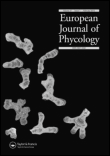
EUROPEAN JOURNAL OF PHYCOLOGY
Pioneering Studies in Algal EcologyThe EUROPEAN JOURNAL OF PHYCOLOGY, published by TAYLOR & FRANCIS LTD, stands as a prominent platform in the fields of Aquatic Science and Plant Science, reflecting its significant contribution to the understanding of algae and freshwater ecosystems. With an ISSN of 0967-0262 and an E-ISSN of 1469-4433, this journal has been disseminating valuable research since its inception in 1993, and it continues to play a pivotal role in advancing scientific knowledge through to 2024. Recognized in the Q2 category for both Aquatic and Plant Sciences in the 2023 rankings, it holds a commendable position in Scopus, being ranked #125 out of 516 and #63 out of 247, respectively. The journal is particularly valuable for researchers, professionals, and students seeking to explore innovative studies and methodologies in phycology and related disciplines. Although it does not currently offer open access, it provides an essential resource for those looking to deepen their understanding of algae's ecological roles and applications.
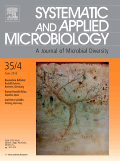
SYSTEMATIC AND APPLIED MICROBIOLOGY
Connecting Knowledge and Application in MicrobiologySYSTEMATIC AND APPLIED MICROBIOLOGY, with ISSN 0723-2020 and E-ISSN 1618-0984, is a prestigious journal published by Elsevier GmbH, located in Munich, Germany. Established in 1983, this journal provides a critical platform for the dissemination of high-quality research in the fields of applied microbiology, ecology, and biotechnology. With a commendable impact reflected in its 2023 Q1 ranking in Applied Microbiology and Biotechnology, and Ecology, Evolution, Behavior and Systematics, along with a Q2 ranking in Microbiology, SYSTEMATIC AND APPLIED MICROBIOLOGY maintains a high standard of scholarly excellence. As part of the Scopus database, it ranks prominently—79th out of 721 in Ecology, and within the top quartiles for its relevant fields, potent in disseminating implications for researchers, professionals, and students alike. Although it does not offer open access, the journal is dedicated to advancing knowledge and innovation in microbiological research, making it an essential resource for anyone in the field seeking to stay abreast of current findings and applications.

EXTREMOPHILES
Illuminating the Secrets of Extremophilic AdaptationsEXTREMOPHILES is a distinguished academic journal published by SPRINGER JAPAN KK, focusing on the fascinating and diverse field of extremophile research. With its ISSN 1431-0651 and E-ISSN 1433-4909, this journal serves as a vital platform for scholars interested in the adaptations and possibilities of life in extreme environments. Since its inception in 1997, EXTREMOPHILES has significantly contributed to advancing the understanding of extremophilic organisms and their applications across various disciplines, as evidenced by its respectable rankings—holding a Q2 category in both Medicine (miscellaneous) and Microbiology, and a Q3 in Molecular Medicine as of 2023. Researchers and professionals in the fields of microbiology, biochemistry, and molecular medicine will find this journal an essential resource, providing insights into the mechanisms of extremophiles and their biotechnological implications. Despite not being open access, its comprehensive scope and rigorous peer-review process ensure that only high-quality, impactful research reaches its readers. For anyone eager to delve into the secrets of life in extreme conditions, EXTREMOPHILES stands as a premier journal worthy of attention.